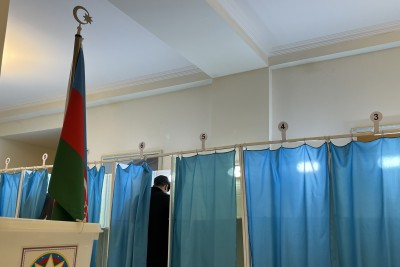International Observers: Lack of Political Alternatives in Presidential Elections in Azerbaijan
International observers have found that the early presidential election in Azerbaijan lacked genuine political pluralism due to a restrictive environment. Russia has sharply criticized the OSCE mission for its lack of understanding of election monitoring.
 In Azerbaijan's early presidential election, voters cast their ballots. / Picture: © OSCE/Katya Andrusz, ID 562476, (CC BY-ND 4.0)
In Azerbaijan's early presidential election, voters cast their ballots. / Picture: © OSCE/Katya Andrusz, ID 562476, (CC BY-ND 4.0)
The early presidential election in Azerbaijan lacked genuine political pluralism in a restricted environment, according to international observers. The election, which was held for the first time in the entire internationally recognized territory of the Republic of Azerbaijan, was characterized by efficiency and professionalism in preparation, but critical voices were continuously suppressed and long-standing restrictions on freedom of association and expression were reinforced by recent legislative changes.
The joint monitoring mission of the OSCE Office for Democratic Institutions and Human Rights (ODIHR) and the OSCE Parliamentary Assembly (OSCE PA) found that while the election code regulates all aspects of the electoral process in detail, recent amendments did not take into account previous ODIHR recommendations.
Artur Gerasymov, the Special Co-ordinator and Head of the OSCE Short-Term Observers emphasized that the election took place in a restrictive environment, with critical voices and political alternatives largely absent. The campaign remained low-key throughout, without significant public participation, and was not competitive. Although six other candidates participated in the campaign, none of them presented a convincing challenge to the policies of the incumbent president, depriving voters of a real alternative.
While equal treatment of women and men is enshrined in law, specific measures to promote women's participation are lacking and women are underrepresented in all areas of public and political life. No woman has run in a presidential election since 2013.
Daniela De Ridder, head of the OSCE PA delegation, noted that the lack of an engaging and informative public campaign between political alternatives, as well as an extremely limited media environment, deprived voters of the opportunity to meaningfully inform themselves about the options on election day. In addition, women are severely underrepresented in political life, despite carrying the bulk of the organizational work on election day.
The election, in which some 6.5 million voters registered, was calm and orderly overall, but observers noted significant shortcomings, particularly concerning the secrecy of the vote, lack of safeguards against multiple voting, evidence of ballot box stuffing, and identical signatures on voter lists. This raises serious questions as to whether the votes were counted and reported honestly.
Highly restrictive media legislation and recent arrests of critical journalists have meant that media outlets cannot operate freely, leading to widespread self-censorship and limiting the space for independent journalism and critical debate. The minimal coverage of the candidates and the campaign reduced the opportunity for voters to learn more about the candidates and their platforms to make an informed decision on election day.
Eoghan Murphy, Head of the ODIHR Election Observation Mission, emphasized that in this important election for the country, none of the candidates convincingly challenged the incumbent president and some opposition parties refrained from participating altogether as they considered the democratic conditions insufficient. Despite efficient and professional preparations, including the training of election commission members, important security precautions were often disregarded on election day and significant procedural errors were observed.
The international election observation mission for the early presidential election in Azerbaijan comprised a total of 335 observers from 42 countries, including 256 experts deployed by the ODIHR as well as long-term and short-term observers and 79 from the OSCE PA.
Criticism from Russia
Russia sharply criticized the OSCE, above all to delegitimize it for the observer mission in Russia itself. Maria Zakharova, spokeswoman for the Russian Foreign Ministry, voiced harsh criticism of the mission of the Organization for Security and Co-operation in Europe's Office for Democratic Institutions and Human Rights at a meeting of the Federation Council Commission for the Protection of State Sovereignty and the Prevention of Interference in Russia's Internal Affairs. According to a report by Azernews, Zakharova claims that the OSCE ODIHR mission has "no idea how elections should be monitored".
Zakharova described the OSCE ODIHR mission's report on the results of the early presidential elections in Azerbaijan as a "masterpiece" and emphasized that she could not resist quoting it. In her opinion, it does not matter what the election-holding countries do, how many candidates from different parties they register, or what platforms they have. The result for the OSCE observers would always be the same: political involvement and a pre-determined outcome.
"I have a question for the OSCE ODIHR. Have they ever heard of the concept of societal consolidation at a critically important moment for the state? In my opinion, they have not. And if they haven't, then they have no idea how to observe elections," said Zakharova. It is clear from these statements that tensions are increasing between Russia and the OSCE organizations, particularly regarding the evaluation and monitoring of electoral processes for the upcoming Russian presidential election.



